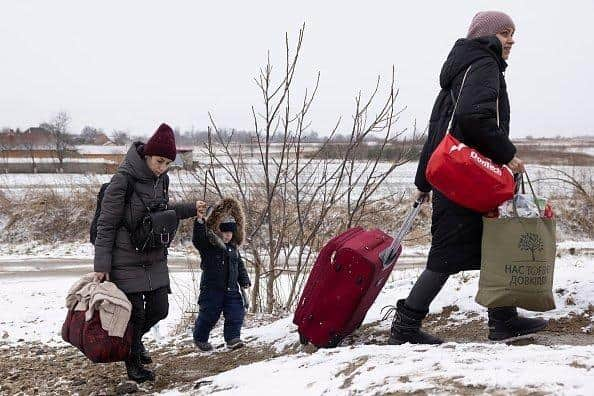Worrying safeguarding cases highlighted as challenges and successes revealed under 'Homes for Ukraine' scheme in Sunderland
and live on Freeview channel 276
The ‘Homes for Ukraine’ scheme, announced by Government earlier this year, allows individuals, families, community groups and businesses to host people fleeing the war-torn country.
Sponsors and hosts involved in the UK scheme are given a £350 “thank you payment” per month for up to 12 months, subject to providing “appropriate and compliant accommodation”.
Advertisement
Hide AdAdvertisement
Hide AdSunderland City Council, which is administering the scheme locally in line with government guidance, has a number of responsibilities.


This includes monitoring visa application data, carrying out safeguarding checks and interventions, pre and post arrival checks, accommodation and welfare checks and helping with the “re-matching” process.
According to data revealed at the city council’s Economic Prosperity Scrutiny Committee, there have been 91 arrivals in the city so far.
This includes 52 single adult females, three single adult males and 36 children, with 24 families (adults with children) arriving in total.
As of July 8, 2022, around 80 hosts had received guests and 186 matches had been made, against a backdrop of 721 expressions of interest from potential sponsors in Sunderland looking to host Ukrainian refugees.
Advertisement
Hide AdAdvertisement
Hide AdThe data noted that of the Ukrainian refugees settled in Sunderland so far, there have been seven ‘safeguarding interventions’ and seven “host breakdowns”.
During the presentation at City Hall, councillors heard some of the “extremes” of cases council officers had encountered on Wearside.
This included a disabled Sunderland host paying for flights in an alleged exchange for free care, a vulnerable teenager being evicted and officers and police identifying, intercepting and preventing a match involving a female teenager that raised serious safeguarding concerns.
Council officers stressed the local authority is able to provide temporary accommodation with specific support for those in need.
Advertisement
Hide AdAdvertisement
Hide AdWork is also ongoing to help re-match Ukrainian refugees with other host families if placements break down due to cultural or lifestyle differences.
Graham Scanlon, assistant director of housing and communities on the council, updated councillors on the Homes for Ukraine scheme as part of a wider presentation on refugee and asylum seeker programmes.
Councillors heard that Sunderland was housing refugees from Afghanistan under two main resettlement programmes, as well as continuing to welcome asylum seekers.
Although a lot of Afghans remain in hotels across the country, council documents said, policies are under review which will change “future accommodation matches”.
Advertisement
Hide AdAdvertisement
Hide AdAs part of the “asylum seeker dispersal programme”, 480 asylum seekers are recorded in Sunderland, with 323 males and 157 females, representing 261 single people and 64 families.
During discussion at City Hall this week, Councillor Sean Laws suggested there was a “two-tier system” in terms of accommodation solutions which favoured Ukrainian refugees over refugees from Afghanistan.
Councillor Usman Ali questioned whether Homes for Ukraine data provided a true picture of placements across the city and referenced local reports of refugees being asked to do housework and gardening.
Concerns were also raised about the ability of families to continue hosting Ukrainian refugees as the cost-of-living crisis worsens and pressure increases on household budgets.
Advertisement
Hide AdAdvertisement
Hide AdCouncil officer Mr Scanlon stressed that the local authority was following government guidance around the schemes and that a local authority ‘vulnerable groups’ team was working to provide housing support.
The council housing chief added work was ongoing with partners to tackle issues around housing availability and that the council would always work to prevent homelessness.
Councillors were also told that Homes for Ukraine matches were now subject to “fast-tracked” enhanced DBS checks as an extra safety measure.